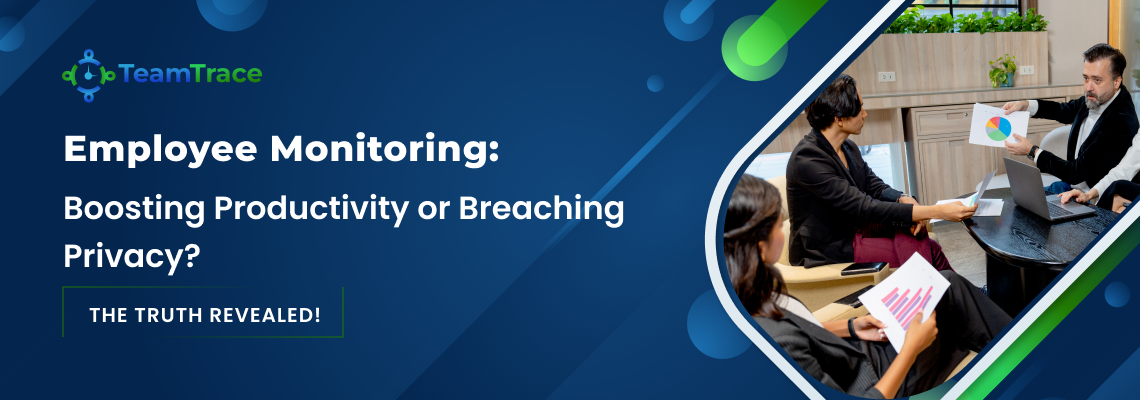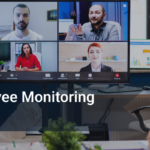Organizations adopt employee monitoring software for various reasons. Some of the most common justifications include:
Productivity Enhancement
By tracking work patterns and user activity, companies can identify inefficiencies and improve workflow. This ensures that employees remain focused and contribute effectively to business goals. 82% believe that monitoring aimed at boosting workforce productivity can lead to fairer pay, promotions, and appraisal decisions— a significant advantage for employees.
Insider Threat Management
Internal security threats pose significant risks to businesses. Employee monitoring software helps detect suspicious behaviors that could lead to fraud, intellectual property theft, or unauthorized access to sensitive information.
Preventing Data Breaches
Cybersecurity threats are on the rise, and organizations must safeguard their data. Monitoring employee activities can help prevent data breaches by identifying vulnerabilities and preventing unauthorized access.
Workplace Investigation
In cases of policy violations or disputes, workplace investigation tools assist HR and legal teams in gathering evidence. These investigations ensure fair and unbiased decision-making.
Compliance with Industry Regulations
Many industries, such as finance and healthcare, require strict compliance with data protection laws. Employee monitoring software helps organizations adhere to these regulations and avoid legal complications.
Despite its advantages, employee monitoring ethics remains a major concern. Unchecked surveillance can harm employee engagement and create a culture of distrust. Some key ethical concerns include:
Privacy Invasion
Employees may feel uncomfortable knowing their every move is being tracked. Excessive user activity tracking can lead to stress and anxiety, impacting productivity and morale.
Lack of Transparency
Employees may feel deceived if organizations do not communicate their employee monitoring policies. Transparency is crucial in maintaining trust between employers and employees.
Misuse of Data
Collected data should only be used for legitimate purposes, such as insider threat management or employee attendance monitoring. Any misuse, such as personal surveillance, could lead to legal consequences and ethical violations.
Unfair Evaluations
Relying solely on employee monitoring software to assess performance may not always be accurate. It is essential to consider context and human judgment when evaluating productivity.
Impact on Employee Engagement
When employees feel they are constantly watched, their employee engagement may decrease. Fear of micromanagement can stifle creativity and innovation in the workplace.
Ethical employee monitoring is not just a moral obligation but also a legal requirement. Various laws govern employee monitoring ethics, ensuring that businesses do not violate privacy rights.
General Data Protection Regulation (GDPR)
The GDPR enforces strict regulations on data collection and privacy. Employers must inform employees about user activity tracking and obtain consent where necessary.
Electronic Communications Privacy Act (ECPA) – U.S.
In the U.S., the ECPA regulates the monitoring of electronic communications. Employers must ensure that their monitoring practices do not infringe on personal privacy.
California Consumer Privacy Act (CCPA)
The CCPA grants employees rights over their data, including the ability to access and delete collected information.
EU Workplace Privacy Laws
European laws emphasize proportionality in employee monitoring. Employers must justify the necessity of monitoring and ensure it aligns with labor rights.
Local Regulations
Different countries and states have varying laws regarding employee monitoring software. Businesses must stay updated with regional regulations to ensure compliance.
To ensure that employee monitoring is conducted ethically, organizations must implement strategies that respect employee privacy while achieving business objectives. Here are detailed best practices to follow:
1. Establish Clear Policies and Communicate Them Transparently
One of the most critical aspects of employee monitoring ethics is transparency. Employees should know
- What data is being collected?- Examples include website visits, app usage, keystrokes, or location tracking.
- Why the data is being collected – To enhance productivity, ensure security, prevent data breaches, or comply with regulations.
- How the data is used – Whether it’s for workplace investigations, tracking time spent on tasks, or identifying workflow inefficiencies.
A well-documented policy should be included in employee handbooks, and organizations should hold training sessions to explain t
2. Monitor for Business Purposes Only
Employee monitoring software should be used strictly for insider threat management, security, and productivity improvements. Businesses should avoid:
- Excessive micromanagement – Monitoring should not be used to scrutinize every minor action of an employee.
- Personal tracking – Employees should not be monitored outside of work hours unless legally required (e.g., company-provided devices).
- Bias in data interpretation – Avoid using user activity tracking as the sole measure of performance.
Employers must set clear guidelines on employee monitoring ethics to prevent misuse. he monitoring process.
3. Use Ethical Employee Monitoring Software
Not all employee monitoring software is designed with ethics in mind. Choose tools that:
- Offer transparency – Employees should have visibility into their data and be notified when monitoring occurs.
- Ensure security – The software should comply with regulations such as GDPR and CCPA, offering encrypted data storage.
- Focus on productivity insights – Rather than invasive tracking, the tool should provide valuable insights into efficiency without overstepping privacy.
Many modern employee monitoring software solutions now offer dashboards that allow employees to view their productivity reports, promoting a culture of openness.
4. Limit Data Collection to Essential Information
Organizations should only collect data that serves a legitimate business interest. For instance:
- Monitoring internet usage is reasonable for cybersecurity, but tracking personal messages may be invasive.
- Tracking log-in and log-out times is useful for employee attendance monitoring, but capturing every keyboard input could be excessive.
By limiting data collection, businesses can reduce workplace investigation risks and avoid overstepping ethical boundaries.
5. Secure Employee Data and Maintain Confidentiality
Once data is collected, securing it is just as important as gathering it. To prevent data breaches and unauthorized access:
- Restrict access to monitoring reports – Only HR, IT security teams, and relevant managers should have access.
- Encrypt sensitive data – Use strong encryption to prevent cyberattacks.
- Anonymize data where possible – If analyzing productivity trends, use anonymized data to protect individual privacy.
- Comply with legal standards – Follow laws like GDPR to avoid penalties related to privacy violations.
Companies should have clear policies on how long data will be stored and ensure that it is deleted when no longer needed.
6. Implement Employee Consent and Feedback Mechanisms
Rather than enforcing surveillance, organizations should involve employees in the process by:
- Obtaining consent where applicable – While not all jurisdictions require consent for employee monitoring, it fosters trust when employees are given the option.
- Providing access to personal monitoring data – Allow employees to view their activity reports, making the process more transparent.
- Encouraging feedback – Conduct periodic surveys to gauge how employees feel about monitoring practices and adjust policies accordingly.
When employees feel involved in monitoring decisions, employee engagement improves, reducing resistance to tracking measures.
7. Monitor Only During Work Hours
Organizations should avoid user activity tracking outside of work hours unless employees are using company devices for official tasks. Ethical practices include:
- Not tracking personal emails, social media, or non-work-related sites unless there’s a specific compliance need.
- Ensuring remote employees have privacy – Remote or hybrid workers should not feel like they are being watched continuously.
- Using time-tracking for attendance only – Employee attendance monitoring should focus on clock-in and clock-out times rather than excessive surveillance.
Companies that overstep boundaries risk lowering employee engagement and increasing stress.
8. Combine Monitoring with Trust-Based Management
While employee monitoring software can provide useful insights, it should not replace trust. Ethical organizations:
- Encourage autonomy – Allow employees to manage their tasks without feeling micromanaged.
- Recognize achievements beyond monitoring – Don’t rely solely on user activity tracking to assess productivity; consider qualitative contributions.
- Promote open communication – If productivity concerns arise, discuss them with employees before making monitoring decisions.
A balanced approach ensures that employee monitoring ethics align with a positive work culture.
The ethical implications of employee monitoring require a delicate balance between business security and employee privacy. While employee monitoring software plays a crucial role in insider threat management, workplace investigation, and data breach prevention, organizations must prioritize employee monitoring ethics to maintain trust and compliance.
By adopting transparent policies, respecting privacy, and using user activity tracking responsibly, businesses can foster a positive work environment. Ethical employee monitoring is not about control—it’s about creating a secure and productive workplace while ensuring that employees feel valued and respected.



